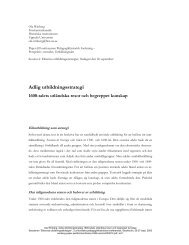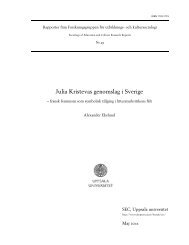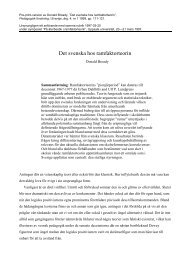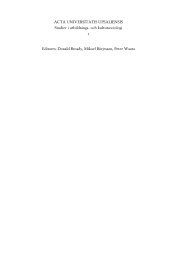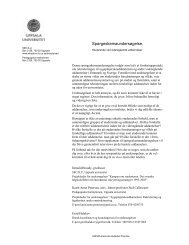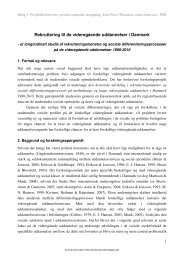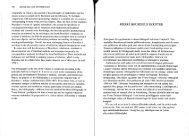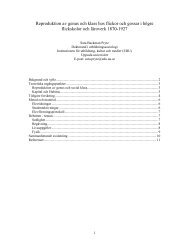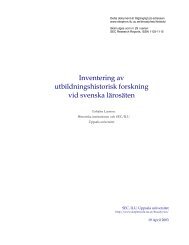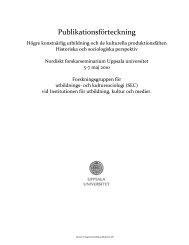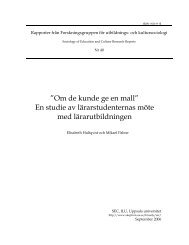exploring uses of digital archives in research and ... - skeptron.uu.se
exploring uses of digital archives in research and ... - skeptron.uu.se
exploring uses of digital archives in research and ... - skeptron.uu.se
Create successful ePaper yourself
Turn your PDF publications into a flip-book with our unique Google optimized e-Paper software.
Furthermore, the move away from proprietary solutions <strong>and</strong> towards open st<strong>and</strong>ards will<strong>of</strong>fer better opportunities for teachers <strong>and</strong> students to benefit from exist<strong>in</strong>g <strong>digital</strong> <strong>archives</strong><strong>and</strong> other resources, which are today ma<strong>in</strong>ly u<strong>se</strong>d by <strong>re<strong>se</strong>arch</strong> communities <strong>and</strong> otherspecialists.However, today the benefit <strong>of</strong> appropriate mark-up is not evident to most u<strong>se</strong>rs <strong>in</strong> theeducational <strong>se</strong>ctor. On the contrary, teachers <strong>and</strong> students are prone to accept cour<strong>se</strong>wareba<strong>se</strong>d on ad-hoc categorization, redundant <strong>in</strong>formation, proprietary applications <strong>and</strong>formats such as PDF, non-modularized solutions, <strong>and</strong> rudimentary mark-up (typically rawHTML). This attitude is quit underst<strong>and</strong>able, for <strong>se</strong>veral reasons. The cour<strong>se</strong>warepublish<strong>in</strong>g ho<strong>u<strong>se</strong>s</strong> are reluctant to deliver content <strong>in</strong> portable formats s<strong>in</strong>ce they - as well asthe s<strong>of</strong>tware producers - prefer to keep the costumers tied to the vendors’ proprietarysolutions.A <strong>se</strong>cond reason is that teachers are not u<strong>se</strong>d to <strong>se</strong>parate what is taught from how it islearnt, that is to <strong>se</strong>parate content from its pre<strong>se</strong>ntation forms. Therefore, they do notspontaneously applau<strong>se</strong> the opportunities to utilize different filter<strong>in</strong>g <strong>and</strong> pre<strong>se</strong>ntation tools<strong>in</strong> order to u<strong>se</strong> the same <strong>digital</strong> archive for different cour<strong>se</strong>s <strong>and</strong>/or for different studentgroups. They do not consider the possibility to accumulate content <strong>in</strong>to <strong>archives</strong> throughwhich the students might be suggested paths or from which sub<strong>se</strong>ts <strong>of</strong> content modulesmight be <strong>in</strong>corporated <strong>in</strong>to the student’s portfolios - or even produced by the studentsthem<strong>se</strong>lves. Instead many teachers tend to regard content as hardwired <strong>in</strong>to the syllabus <strong>of</strong>certa<strong>in</strong> cour<strong>se</strong>s. 53A third reason why teachers are lagg<strong>in</strong>g beh<strong>in</strong>d many <strong>re<strong>se</strong>arch</strong> discipl<strong>in</strong>es <strong>and</strong> <strong>in</strong>dustrial<strong>se</strong>ctors is the shortage <strong>of</strong> appropriate <strong>and</strong> easy-to-u<strong>se</strong> tools allow<strong>in</strong>g teachers <strong>and</strong> studentsto access portable resources <strong>and</strong> to create their own content <strong>archives</strong> or portfolios. 54 Thecreation <strong>of</strong> structured marked-up <strong>and</strong> metadata-enriched content still requires skills that arefairly rare with<strong>in</strong> the educational <strong>se</strong>ctor. Even if XML editors are available the mark-upprocedures still are too non-transparent <strong>and</strong> tedious for most u<strong>se</strong>rs. Even if the currentversions <strong>of</strong> ord<strong>in</strong>ary web brow<strong>se</strong>rs have some support for XML, most teachers do not haveany clue about how to make u<strong>se</strong> <strong>of</strong> tho<strong>se</strong> facilities.In order to f<strong>in</strong>d out how teachers <strong>and</strong> students might benefit from emerg<strong>in</strong>g mark-up <strong>and</strong>metadata recommendations <strong>and</strong> st<strong>and</strong>ards there is a need for both better tools <strong>and</strong> moredeveloped methods. The propo<strong>se</strong>d PhD project might be a modest contribution to this end.Both by <strong>in</strong>vestigat<strong>in</strong>g how exist<strong>in</strong>g <strong>digital</strong> <strong>archives</strong> are u<strong>se</strong>d <strong>and</strong> both by the application <strong>of</strong>a few tools <strong>in</strong> the <strong>digital</strong> archive which is developed <strong>and</strong> ma<strong>in</strong>ta<strong>in</strong>ed with<strong>in</strong> the <strong>re<strong>se</strong>arch</strong>group where I participate; Digital Literature at Uppsala University. 55Content design <strong>in</strong> <strong>re<strong>se</strong>arch</strong> communitiesIn order to f<strong>in</strong>d <strong>in</strong>spiration for more general educational applications, I will also explorehow <strong>digital</strong> <strong>archives</strong> are <strong>in</strong> fact u<strong>se</strong>d <strong>in</strong> some <strong>re<strong>se</strong>arch</strong> communities.The emerg<strong>in</strong>g development <strong>of</strong> multi-discipl<strong>in</strong>ary fields <strong>and</strong> heterogeneous audiences atuniversities makes communities even more complicated both <strong>in</strong> terms <strong>of</strong> the disparatenature <strong>of</strong> shared <strong>digital</strong> resources <strong>and</strong> becau<strong>se</strong> <strong>of</strong> the more heterogeneous background <strong>of</strong>the participants - as <strong>in</strong> bio<strong>in</strong>formatics where PhD students might have their major <strong>in</strong>comput<strong>in</strong>g science, mathematics, biology, chemistry or medic<strong>in</strong>e.53 See e.g. Broady, 2001 <strong>and</strong> Fl<strong>and</strong>ers, 2002.54 See Sjunnesson, 2003 for an overview <strong>of</strong> metadata for learn<strong>in</strong>g objects on the Web.55 See http://www.<strong>skeptron</strong>.ilu.<strong>uu</strong>.<strong>se</strong>/broady/dl/<strong>in</strong>dex.htm for further <strong>in</strong>formation.pm-030505.doc utkast avh.pm. Monica Langerth Zetterman 11(34)



